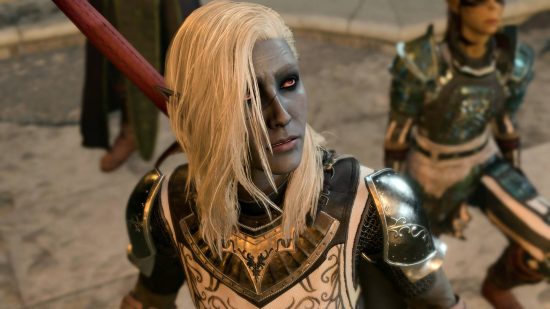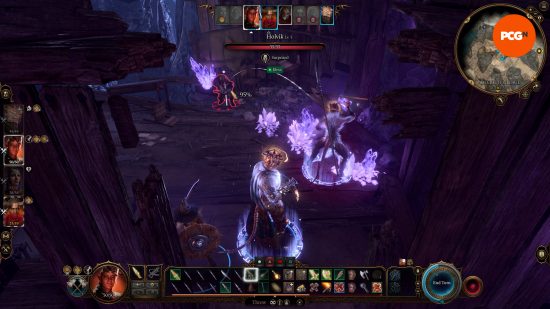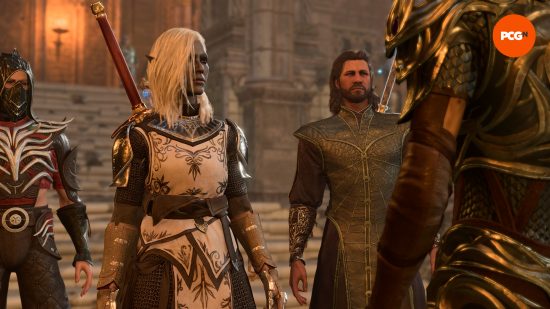Dungeons & Dragons is responsible for more videogames than you’d think. Obviously Baldur’s Gate 3 springs to mind, but when you think deeper, almost any RPG that uses a baseline stat system evolved from those early tabletop roleplaying games. Many of the earliest text-based RPGs played on old CRT screens took inspiration from DnD or were even set in Faerûn-like worlds.
Myriad games use behind-the-scenes digital dice rolling as a core mechanic. The difference with Baldur’s Gate 3 is that it puts its DnD identity front and center, relying on the recent burst of popularity the brand has seen through countless streams and podcasts like Critical Role, Dimension 20, or High Rollers, and the vast amount of new players brought to the tabletop RPGs as a result. The recent movie didn’t hurt either.
Having that identity be so central to Baldur’s Gate 3 is not a bad thing. It elevates the experience and allows those familiar with the world, spells, and characters to get something more out of their time playing. But, annoyingly, like with any fandom, it can lead to some gatekeeping, too. When the game launched, I remember seeing content creators I respect querying whether DnD newbies would have any clue what was going on in BG3. As if not knowing what Tasha’s Hideous Laughter does off-hand would somehow mean they’d lose all gaming prowess.

Not only is the attitude that you cannot fully enjoy Baldur’s Gate 3 without some prior knowledge of DnD somewhat patronizing, but it also risks putting people off trying out the game. My main issue with this line of thinking is that, ultimately, Baldur’s Gate 3 is far more of a videogame experience than a tabletop one.
While fewer games use the ‘action, bonus action, move’ basis for their strategic combat, the combat style in Baldur’s Gate 3 is still extremely reminiscent of other games inside and outside the genre. If you’ve played modern XCOM games, you’re likely going to be au fait with the basics of combat in BG3. If you’ve played Skyrim or Diablo or countless other RPGs, you’ll understand looting and gearing your character. And if you’ve played Larian’s previous title, Divinity: Original Sin 2, you’re most of the way toward understanding the majority of BG3’s core mechanics. The fact that most DnD builds work in Baldur’s Gate 3 is, more than anything, just proof of exceptional game design, rather than evidence of it being a one-to-one videogame version of DnD.
Larian has done a phenomenal job of crafting complex characters that have transcended games media. When my friends who don’t play games started sending me TikToks of Astarion, I knew it was something special. But despite putting an overwhelming amount of dialogue and choice into BG3, and beautifully realising the world of Faerûn, Larian can’t replicate the true depth of choice DnD can offer. For better or worse, one of my companions isn’t going to hand a guard their sock in response to a line of questioning, which is what a friend did in my first game of DnD (yes, we were all annoyed).
Baldur’s Gate 3 might just be one of the deepest, most intricately realized gaming worlds out there, but it still suffers from the limitations every game faces when trying to offer up a bound, finite story. Unless you have the most dedicated DM in the world, chances are most of tabletop DnD will take place in the theatre of the mind.
Even the argument that familiarity with the world of the Forgotten Realms is somehow essential falls flat when you consider how many individuals are familiar with DnD yet know nothing of its most popular setting. I’ve taken part in the tabletop game dozens of times, yet always played in either a custom setting or in another popular world, such as Critical Role’s Exandria, through source books like Call of the Netherdeep.
But perhaps the single largest videogame-ified departure from DnD is the ability to quick save. Good luck convincing your DM to allow you to go back and re-roll that nat-1 charisma check you rolled when your bard tried to seduce the enemy arch-lich. In my first playthrough of Baldur’s Gate 3, I tried to roll (ha) with the punches and take my failed ability checks, but there are simply too many integral moments that rely on you succeeding one. Can’t convince that NPC to let you into an area with a significant side quest? Reload or don’t bother. It’s an understandable design choice but does ultimately lessen the significance of the dice-rolling mechanic.
Baldur’s Gate 3 is a phenomenal work of art and a true testament to what developers can achieve when they have passion and a vision. It’s precisely why it’s a top pick for many game of the year lists. But I think by now we can all agree that the game transcends simply being a DnD videogame and is instead a monumental achievement that happens to use DnD and one of its most famous universes as a setting. Now stop gatekeeping and go romance Astarion for the thirteenth time.


